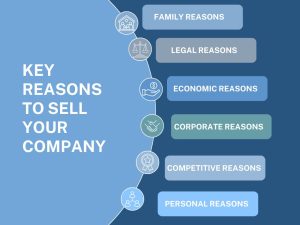When should you sell your company? Decisions to sell a company are at times prompted by factors that affect a business owner. They are unrelated to the performance of the company or larger market realities. However, as a general rule these types of sale decisions do not lead to an optimal sale price.
Many business owners who sell a company are motivated by a desire to obtain the highest price possible. Therefore, it is important to analyze the factors that investors take into consideration when making a company acquisition. Aligning a company sale process with these factors will generally lead to a better overall sales strategy, a speedier sales process and better sale terms for business owners.
“Aligning a company sale process with founder motivations, company performance factors and larger market realities can greatly improve the chances of selling a company and securing better sale terms.”
Reasons to continue selling your company:

There are different reasons to consider selling your company, which may include personal, family, legal, economic, corporate, or competitive factors.
- Personal reasons could be physical or behavioral issues.
- Family reasons often arise when disagreements about succession occur.
- Legal factors, often beyond your control, could be changes in legislation.
- Economic reasons may stem from a lack of funds or the search for new investments.
- Corporate factors involve shareholder decisions, while competitive threats could be predicted if addressed in time.
Beyond surface-level reasons such as personal, family, legal, economic, corporate, or competitive factors, deeper motivations may require aligning the company sale process with the founder’s goals, company performance, and broader market realities. Doing so can significantly improve the likelihood of a successful sale and better terms. When these deeper factors are thoroughly considered, it often leads to a more informed and profitable sale decision.
When to Sell: Founder, Company, and Market Considerations
Founder Factors in Timing of Sale
Business owner motivation for selling a company can be based on factors that are specifically related to the founder rather than those related to the company or the larger market. These factors can include:
-A decision by the founder to spend his or her time on a different business activity;
-A decision by the founder to retire and spend more time with his or her family;
-A desire by the founder to “cash out” and convert his or her ownership position into money to invest in a different venture, pay financial obligations or distribute to members of his or her family; or
-An illness of the founder or other situation that makes it difficult for the founder to continue with the business.
While each of these factors is of course a valid reason for the decision to sell a company, if a decision to sell a company is made completely independent of a consideration of factors related to the company and the larger market, the company will often not be sold for its optimal price, particularly when these factors are not favorable.
Company Factors in Timing of Sale
A second set of factors that may affect a business owner’s decision to sell are factors that are specifically related to a company. These factors can be broadly divided into positive or negative events.
Positive Company Events
One trigger of the decision to sell a company can be a positive event in a company that is independent of market circumstances. This type of event is often related to a company’s financial performance, but it can also involve:
-the development of technology;
-the discovery of an important natural resource;
-a significant ramp up of the company’s market presence;
-or the announcement of the company entering into a valuable strategic relationship.
Negative Company Events
A second trigger of a company sale decision is a negative event at a company that is independent of market circumstances. The first type of negative event is one that affects the financial viability of a company. Examples of this type of event include:
-a loss of major clients or business channels;
-a sustained drop in revenues or an increase in fixed costs;
-an significant increase in the company’s cost of capital; or
-major litigation.
A second type of negative event or issue is one that does not directly impact the financial viability of the company but rather relates to the willingness of company founders to continue to work together. This might be due to, for example, a major disagreement between the owners about how a company should be run.
Market Factors in Timing of Sale
A third set of factors that may affect a business owner’s decision to sell a company is related to the realities of the market where the company does business.
Positive Market Factors
Business founders may be motivated by a desire to sell their company because of positive market factors, such as strong country GDP growth or positive sector trends. A sudden surge in home affordability, for example, may greatly increase the interest of investors in buying companies that provide real estate loans. A large growth in the mining industry will likely increase the interest of investors in purchasing companies that provide mining services.
Negative Market Factors
Negative market factors may also be strong drivers of decisions to sell a company. A business owner may sell their company if they feel the country’s economic or political situation is worsening. Concerned about these conditions, they might act before the situation deteriorates further. Selling early can help avoid potential losses and uncertainty in the future.
The Investor’s Perspective in Timing of Sale
A successful M&A deal, of course, is not only dependent on the motivations of a seller. Many investors will view positive and negative company and market factors in the same way that a business owner would. However, there are other factors that are particularly relevant for investors. Moreover, these often significantly affect their investment timing.
Many investors use leverage when making an acquisition. Therefore, appetite for acquisitions will generally increase when debt financing is more available and interest rates fall. The current global low interest rate environment has contributed to many companies searching for acquisition targets.
For investors that invest across borders, exchange rates can be an important deal timing consideration. If the currency of the country where the company is located weakens, the costs of an acquisition will fall. Similarly, a currency that historically or currently is experiencing a great deal of volatility will create increased uncertainty. This will generally lower the price that an investor is willing to purchase a company for.
Also with respect to cross-border investment strategies, perhaps the factor that has the greatest impact on an investment decision is a country’s general risk profile. When a country’s risk profile significantly increases, the price that investors are willing to pay for a company will often substantially fall even if the company is essentially insulated from the factors that are increasing general country risk.
Conclusion: Finding the Right Timing for the Sale of Your Company
While the decision to sell a company may be motivated by reasons that are not financial in nature, for business owners that are interested in maximizing the price that is paid for their company they should be aware of the great importance than both company and market factors can have on sale price. Due to this, business owners, to the extent possible, should time the sale of a company so that it not only coincides with as many positive company and market factors as possible but also so that it also coincides with the financial, economic and risk management drivers of investor company acquisition decisions.
This article was written by Darin Bifani. If you would like to know more about how to sell your company, take a look at You can sell your business and stay as owner.
The photo for this article was taken by Andrik Langfield Petrides.


